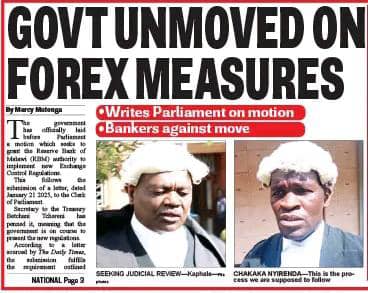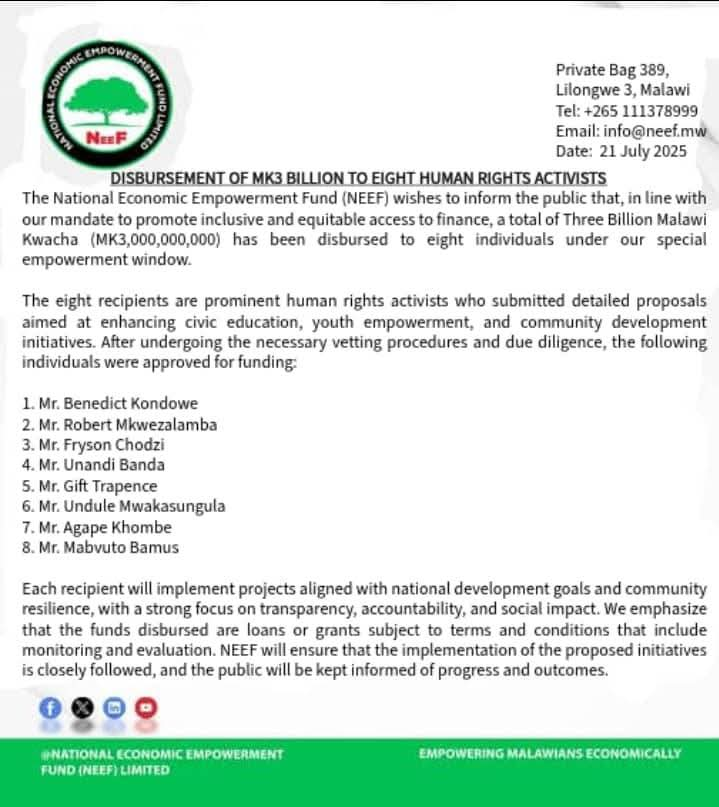By Burnett Munthali
The government has taken a significant step toward reforming Malawi’s financial regulatory framework by officially tabling a motion in Parliament seeking to grant the Reserve Bank of Malawi (RBM) authority to implement new Exchange Control Regulations. The motion, presented by Finance Minister Simplex Chithyola Banda, is aimed at addressing persistent challenges in managing foreign exchange, stabilizing the local currency, and ensuring greater transparency in the financial system.
During the presentation, Minister Chithyola Banda stressed the critical role of the RBM in safeguarding the country’s economic stability, particularly in light of the ongoing forex shortages and irregularities in foreign exchange markets. He noted that the current Exchange Control Regulations, enacted decades ago, have become inadequate in dealing with modern economic dynamics and called for swift action to empower the central bank with updated tools to address these challenges effectively.
“This motion is not just a technical adjustment but a strategic intervention aimed at protecting the integrity of our economy,” Chithyola Banda stated. “The Reserve Bank of Malawi needs the authority to respond decisively to market distortions, curb illegal foreign exchange transactions, and support economic growth through effective management of our scarce forex resources.”
The proposed regulations would introduce more robust mechanisms for monitoring and controlling the movement of foreign exchange within and beyond Malawi’s borders. Among the anticipated changes are tighter reporting requirements for individuals and businesses engaged in international trade, measures to combat illicit financial flows, and policies aimed at discouraging speculative trading in foreign currencies. The regulations also seek to ensure that foreign exchange reserves are prioritized for critical sectors, including agriculture, manufacturing, and energy.
The motion sparked lively debate among Members of Parliament (MPs), with opinions sharply divided along party lines. Supporters of the motion emphasized the urgency of addressing the forex crisis that has plagued the nation in recent years. Many pointed to the adverse effects of currency volatility on essential imports such as fuel, fertilizer, and medical supplies.
Government MP Thokozani Chilima argued that empowering the RBM is the only viable solution to stabilize the kwacha and restore confidence in the financial system. “We cannot afford to let this situation continue unchecked. Strengthening the Reserve Bank’s mandate is a step in the right direction,” Chilima stated.
However, some opposition MPs raised concerns about the potential unintended consequences of the proposed regulations. They warned that increased regulatory controls might deter foreign investors and create bureaucratic hurdles for businesses. Opposition MP Clement Nyirenda urged the government to ensure that the regulations do not stifle private sector growth or burden ordinary citizens.
“We must avoid policies that choke economic activity,” Nyirenda cautioned. “While we support measures to improve forex management, the government must be transparent and consult widely to avoid unintended economic disruptions.”
Outside Parliament, reactions to the motion have been mixed. The private sector, through the Malawi Confederation of Chambers of Commerce and Industry (MCCCI), has called for inclusive consultations to ensure that the regulations strike a balance between enforcement and business efficiency. Meanwhile, civil society organizations such as the Centre for Social and Economic Policy Research (CSEPR) have expressed support for the initiative, emphasizing the need to curb capital flight and ensure forex reserves are used productively.
Economists have also weighed in, with some praising the government’s efforts to tackle the root causes of forex shortages and illicit transactions. However, others have cautioned that without proper implementation, the new regulations could create opportunities for corruption and inefficiency.
The Reserve Bank of Malawi has welcomed the motion, assuring the public that it is prepared to enforce the new regulations in a transparent and equitable manner, should they be approved by Parliament. RBM Governor Wilson Banda highlighted the central bank’s commitment to working closely with stakeholders to ensure that the measures promote economic stability and growth.
As parliamentary deliberations continue, all eyes remain on the government’s ability to navigate the delicate balance between regulation and fostering a conducive environment for investment and trade. The proposed Exchange Control Regulations represent a critical step toward economic reform, but their success will ultimately depend on effective implementation and the cooperation of all stakeholders.
For many Malawians, the motion brings hope for improved forex availability and economic stability, but the path forward will require thoughtful and inclusive policymaking.
- Malawi Relief Funds UK Drills 12 Boreholes in Dowa, Bringing Safe Water to Over 300 Households
- Namalomba says Mutharika’s government wants closure of Chilima’s death
- Onjezani Kenani expresses concern over Amaryllis Hotel overpriced sale
- Florence Mwangi to Speak at Global Protocol & Diplomatic Network Summit 2026
- Malawi First, People Power Movement Dismiss Corruption Claims Against Frank Mbeta
- NBM plc gives 1,000 bags of maize relief in Zomba
- Limpopo FM calls DPP to speed up all corruption cases in court
- BREAKING NEWS: Drama in Parliament as Speaker Orders Owner of ‘Charm’ to Come Forward
- RBM Governor Rallies Banks to Fund Real Economy as Malawi Faces Economic Headwinds
- Kalindo says the cry for passports continues in Malawi
- Kamangila says Mutharika will be the greatest President in Africa
- BMTV, Ntanyiwa joins hands for foot soldiers concerns to Mutharika
- Limpopo FM urges Malawians to protect K7 trillion to corrupt Judges
- NBM plc supports ESCOM PIESA conference with K10 million
- Jatta Rallies Africa to Unite as He Makes Historic Address to Malawi Parliament
- Kamangila Explodes Over New Tax Plans, Says MRA Failures Are Bleeding Malawi Dry
- Pension Fund Hotel Deal Sparks Transparency Storm as Price Balloons by K100 Billion



















